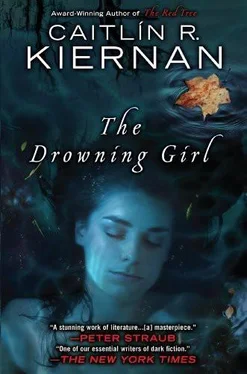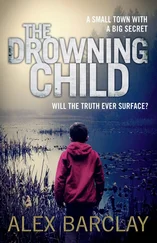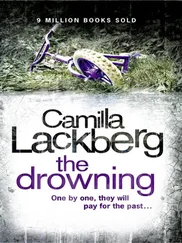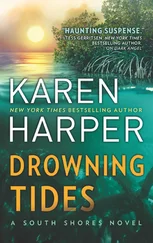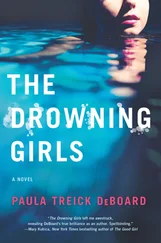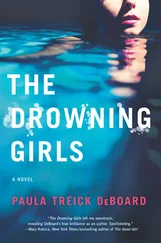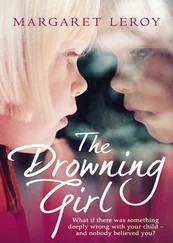Caitlín Kiernan - The Drowning Girl
Здесь есть возможность читать онлайн «Caitlín Kiernan - The Drowning Girl» весь текст электронной книги совершенно бесплатно (целиком полную версию без сокращений). В некоторых случаях можно слушать аудио, скачать через торрент в формате fb2 и присутствует краткое содержание. Год выпуска: 2012, ISBN: 2012, Издательство: Roc / New American Library, Жанр: Фэнтези, на английском языке. Описание произведения, (предисловие) а так же отзывы посетителей доступны на портале библиотеки ЛибКат.
- Название:The Drowning Girl
- Автор:
- Издательство:Roc / New American Library
- Жанр:
- Год:2012
- ISBN:978-0-451-46416-3
- Рейтинг книги:5 / 5. Голосов: 1
-
Избранное:Добавить в избранное
- Отзывы:
-
Ваша оценка:
- 100
- 1
- 2
- 3
- 4
- 5
The Drowning Girl: краткое содержание, описание и аннотация
Предлагаем к чтению аннотацию, описание, краткое содержание или предисловие (зависит от того, что написал сам автор книги «The Drowning Girl»). Если вы не нашли необходимую информацию о книге — напишите в комментариях, мы постараемся отыскать её.
The Drowning Girl — читать онлайн бесплатно полную книгу (весь текст) целиком
Ниже представлен текст книги, разбитый по страницам. Система сохранения места последней прочитанной страницы, позволяет с удобством читать онлайн бесплатно книгу «The Drowning Girl», без необходимости каждый раз заново искать на чём Вы остановились. Поставьте закладку, и сможете в любой момент перейти на страницу, на которой закончили чтение.
Интервал:
Закладка:
A far more malevolent spirit is said to haunt the Blackstone River near the village of Millville. Ask almost anyone in the area, and you may be regaled with the tragic story of a young woman saddled with the good Puritan name of Perishable Shippen. Murdered by her father and tossed into the river, the restless, vengeful ghost of Perishable is said to wander the riverbed, often seizing the feet and legs of unwary bathers and pulling them down to their doom in the murky green waters. Others claim that you can hear the ghost singing to herself on summer evenings, and that her voice is beautiful, but has been known to lure melancholic souls to commit suicide by jumping from railroad and highway bridges, or even flinging themselves from the steep walls of the gorge just upriver of Millville. The story appears to date back at least to the 1830s, a thriving “protoindustrial” time when Millville was the site of grist, fulling, corn, and sawmills, along with a scythe manufacturer. To this day, teenage boys looking to spook their girlfriends often visit the old railroad trestle over the river on the night of the full moon hoping to catch sight of the “Siren of Millville.”
Also, I found:
There’s a folk tradition among some residents of the towns along the Blackstone that many years ago, something from the sea became trapped in the river. The tale usually involves a hurricane and/or a flood, though the details often vary wildly from one teller to the next. Few seem to agree on which disaster was responsible, or how far in the past the event occurred. Variously, the tale invokes the Great Hurricane of 1938, the Saxby Gale of 1869, the Norfolk and Long Island Hurricane of 1821, flooding in February 1886, and again in 1955. But most followed more familiar folktale conventions and would only agree it happened many decades ago, or when they were young or before they were born, or when their great-grandparents were young.
As to what entered the river and remains there to this day, accounts can be divided into the prosaic and the fantastic. The former category includes a shark or several sharks, a sea turtle, a seal, a giant squid, a huge eel, and a dolphin. The latter includes a mermaid, the ghost of a woman (usually a suicide) who drowned in Narragansett Bay, a sea serpent, and, in one instance, a wayward selkie whose sealskin was stolen by a whaler. Yet all agree on two points: the creature or being has caused injury, mishap, and death, and that it originated in the sea. The man who insisted the imprisoned thing was a conger eel claimed that it had been caught and killed when he was a child. He consistently mispronounced conger as conjure .
(from Weird Massachusetts by William Linblad [Worcester: Grey Gull Press, 1986])As with my file on “Little Red Riding Hood,” I have a thick file on the haunting of the Blackstone River containing almost everything I’ve been able to learn about it over the last eight years. Before and after I met Eva Canning—both times, if, indeed, there were two meetings. The file tab was originally labeled “Perishable Shippen,” though Botkin’s is the only account of the legend that grants the murdered woman that name. I’ve never shown the file to Abalyn, though I think now that I should have. That’s one more mistake I made, keeping that history to myself (though, of course, Abalyn believed she’d uncovered her own “history” of Eva). I could make a lengthy roster of those mistakes, things I did that only drove us farther apart. I will say, “If I’d have done this or that differently, we might still be together.” That’s another, more insidious sort of fairy tale. That’s another facet to my haunting—having driven her away—another vicious wrinkle in the meme.
I’ll come back to my file and its contents, after I force myself to spit up one version of the truth.
“A woman in a field—something grabbed her.”
A line from Charles Fort’s Lo! (1931) that I’ve been carrying around in my head for days. It was incorporated into one of Albert Perrault’s paintings. I wanted to get it down here so that I wouldn’t forget it. All the same, this is not where it belongs, not in the first version of the coming of Eva Canning, but in the second. But now I won’t forget it.
July, two years and three months ago and the spare change of a few days (one way or the other). That night alone on the highway in Massachusetts, passing by the river. That night I left Providence alone, but didn’t return alone. I think maybe now I’m ready to try to write it out in some semblance of a story , what I recall of the first version of my meeting with Eva. A story is, by necessity, a sort of necessary fiction, right? If it’s meant to be a true story, then it becomes a synoptic history. I read that phrase someplace, but I can’t for the life of me recall when or where. But I mean, a “true” story, or what we call history, can only ever bear a passing resemblance to the facts, as history is far too complex to ever reduce to anything as clear-cut as a conventional narrative. My history, the history of a city or a nation, the history of a planet or the universe. We can only approximate. So, now that’s what I’ll do. I’ll write an approximation of that night, July 8, the most straightforward I can manage.
But I’ll also keep in mind that history is a slave to reductionism.
Telling this story, I diminish it. I reduce it. I make of it a synodic history.
I render it. That night. This night.
Begin here:
I work until ten o’clock, so I’ve driven the Honda because I dislike walking home from the bus stop after dark. The Armory is a much tamer neighborhood than it used to be, but better safe than sorry, et cetera. I drive home to Willow Street, and Abalyn is sitting on the sofa with her laptop, writing. I go to the kitchen and pour myself a glass of milk and make a fluffernutter sandwich, plenty enough dinner. I rarely eat very much at a time. I snack, I suppose. I bring the milk and my saucer with the sandwich back to the parlor and sit down on the sofa with Abalyn.
“It’s a beautiful night,” I say. “We should go for a drive. It’s a beautiful night for a drive.”
“Is it?” Abalyn asks, briefly glancing up from the screen of the laptop. “I haven’t been outside today.”
“You shouldn’t do that,” I reply. “You shouldn’t stay cooped up in here all day.” I take another bite and watch her while I chew. After I swallow, and have a sip of milk, I ask her what she’s writing.
“A review,” which is what I would have guessed, so it doesn’t seem like much of an answer.
For a few moments, maybe for a few minutes, I eat my sticky sandwich and she types. I almost don’t ask about the drive again, because there’s something so peaceful about the rhythm of the evening as it’s playing out. But then I do ask the question, and from that everything else follows.
“No, Imp,” she says, looking up at me again. “I’m sorry, but I’ve got a deadline. I need to have this piece finished in the next couple of hours. I should have finished it yesterday.” She tells me the name of the game, and it’s one I’d watched her play, but I’ve entirely forgotten what it was. “I’m sorry,” she says again.
“No, that’s okay. No problem.” I try not to sound disappointed, but I’ve never been very good at hiding disappointment. It almost always shows, so I will assume she heard it that night.
“Know what?” she says. “Why don’t you go, anyway? No reason you shouldn’t, just because I’ve got to work. Might even be better without me along. More quiet and all.”
“It won’t be better without you.”
I finish my sandwich and my milk and set the saucer and the empty glass on the floor beside the sofa.
Читать дальшеИнтервал:
Закладка:
Похожие книги на «The Drowning Girl»
Представляем Вашему вниманию похожие книги на «The Drowning Girl» списком для выбора. Мы отобрали схожую по названию и смыслу литературу в надежде предоставить читателям больше вариантов отыскать новые, интересные, ещё непрочитанные произведения.
Обсуждение, отзывы о книге «The Drowning Girl» и просто собственные мнения читателей. Оставьте ваши комментарии, напишите, что Вы думаете о произведении, его смысле или главных героях. Укажите что конкретно понравилось, а что нет, и почему Вы так считаете.
